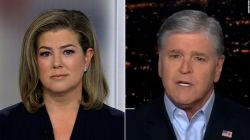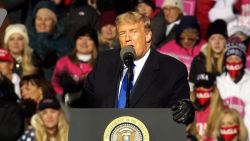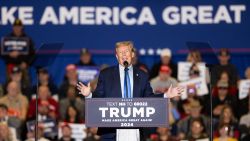The Supreme Court’s rejection Monday of an attempt by Donald Trump to keep Manhattan District Attorney Cyrus Vance from seeing his tax returns (and other financial documents) was rightly cast as a major legal setback for the former President.
But buried in that conclusion is this nagging question: What is Trump so afraid of? As in: Why has he fought so incredibly hard for the past five-plus years to keep anyone from seeing his taxes?
Remember that Trump’s view on releasing his tax returns was not always what it is today.
“If I decide to run for office, I’ll produce my tax returns, absolutely,” Trump said in 2014. “And I would love to do that.” The following year, Trump told conservative radio talk show host Hugh Hewitt: “I would certainly show tax returns if it was necessary.”
In January 2016, Trump was still dangling the possibility of releasing his returns. “I have very big returns, as you know, and I have everything all approved and very beautiful and we’ll be working that over in the next period of time,” Trump said on NBC’s “Meet the Press.” “Absolutely.”
But then something changed. By February 2016, Trump, who was starting to look more and more like the GOP presidential nominee, was starting to backtrack on his previous promises. “We’ll make a determination over the next couple of months,” he told CNN’s Anderson Cooper in an interview that aired on February 24, 2016. “It’s very complicated.”
By the following day, Trump had found his excuse for not releasing his returns; “I get audited. And obviously if I’m being audited, I’m not going to release a return,” he said. “As soon as the audit is done, I love it.”
That, of course, is a flimsy excuse – since there is no law against any person releasing their tax returns while under audit. (Richard Nixon did it while he was in the White House.) The “audit” – which apparently is still going on! – was simply a convenient cover for a decision Trump made sometime in late January or early February 2016: That releasing his returns would be far more politically damaging than the negative publicity he would take for not releasing them.
Trump became the only major party presidential candidate in the post-Watergate era to never release any of his tax returns.
(Sidebar: My strong sense is that when Trump was saying he would release his taxes in the early days of the campaign, it was one of many empty promises he made – assuming that he would never be a serious candidate and/or be called on his various pledges.)
So if an ongoing audit wasn’t – and isn’t – the real reason that Trump has fought so hard to keep his taxes secret, what is? Thanks to The New York Times having obtained a large number of Trump’s past tax records, we now have the ability to answer – or at least make an educated guess – about the answer.
The most likely reason for Trump’s reluctance to release his taxes is that they would reveal two facts:
1) He didn’t pay any taxes for years and years
2) He has massive debts
Let’s take the first point, er, first. Here’s what the Times’ reported about Trump’s taxes:
“Mr. Trump paid no federal income taxes in 11 of 18 years that The Times examined. In 2017, after he became president, his tax bill was only $750.”
How? Well, in large part, by claiming more than $900 million in losses on his 1995 tax return, which could have allowed him to avoid paying taxes for decades. Trump also aggressively sought to lower his taxable income, including claiming a $72.9 million tax refund that remains under investigation by the IRS. As the Times’ David Leonhardt wrote: “Over the past two decades, Mr. Trump has paid about $400 million less in combined federal income taxes than a very wealthy person who paid the average for that group each year.”
Now to Trump’s debts. And again, Leonhardt:
“In 2012, he took out a $100 million mortgage on the commercial space in Trump Tower. He has also sold hundreds of millions worth of stock and bonds. But his financial records indicate that he may have as little as $873,000 left to sell.
“He will soon face several major bills that could put further pressure on his finances.
“He appears to have paid off none of the principal of the Trump Tower mortgage, and the full $100 million comes due in 2022. And if he loses his dispute with the I.R.S. over the 2010 refund, he could owe the government more than $100 million (including interest on the original amount).”
Trump’s refusal to release his taxes during the 2016 campaign is likely explained by the first point. It’s not exactly endearing to voters when a wealthy person paid somewhere between very little and nothing in taxes for years. His considerable debts – and the questions about whether or not he will be able to pay them – are likely the driving force for why Trump continues to work to keep his returns private. If everyone knows he’s in debt and with few options to get out of it, he loses any leverage he might have to go to the financial institutions he owes money to and renegotiate the terms of the loans.
Trump always acts out of self-interest. And he is purely transactional in all of his dealings. His shifting stance on the release of his returns – and his ongoing battle to keep them private – is reflective of both of those points. Trump knows the details of the returns make him look bad and potentially kill any remaining leverage he has to dig himself out of the financial hole he is currently in. And so, he fights like hell to keep them secret.



















